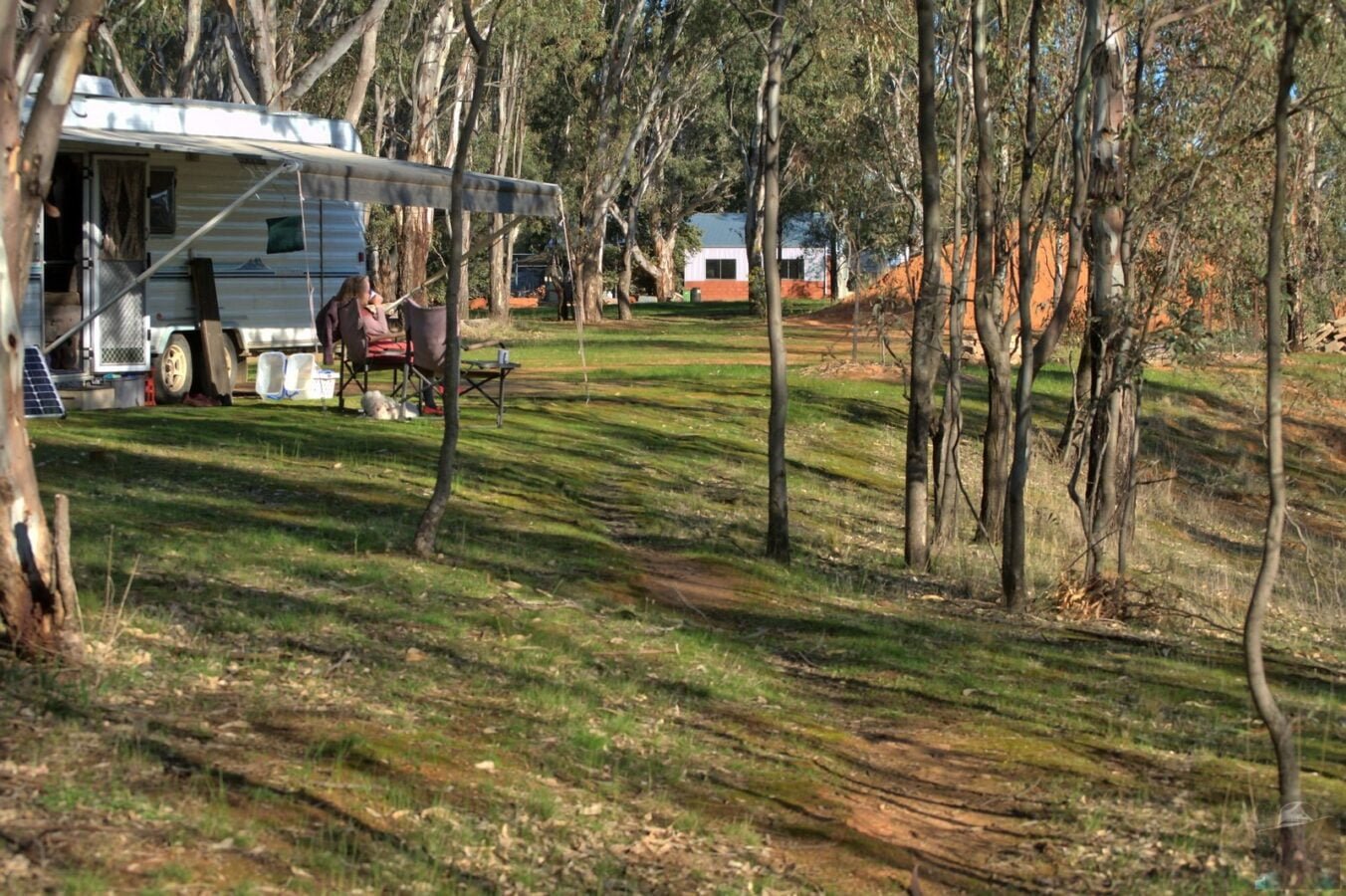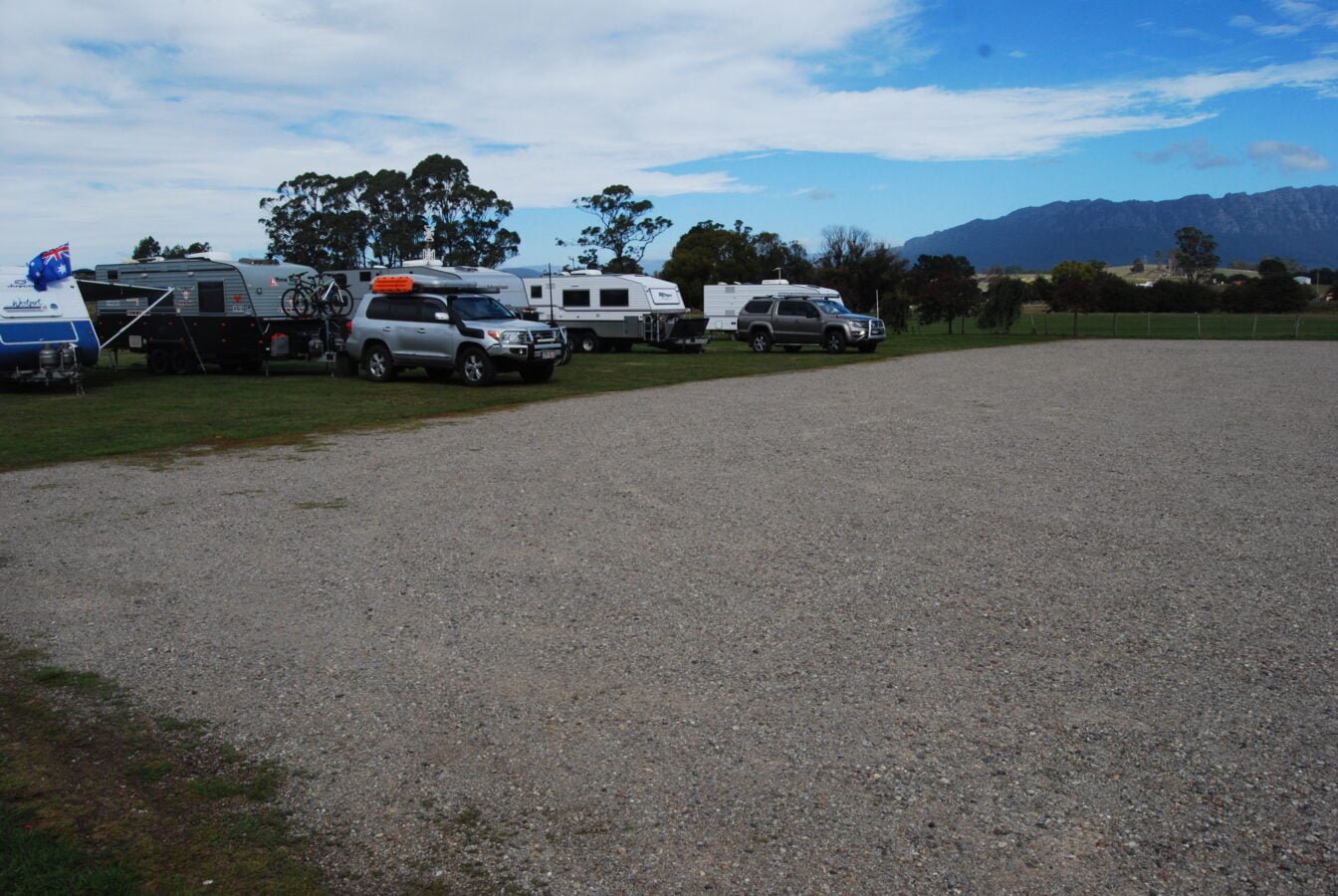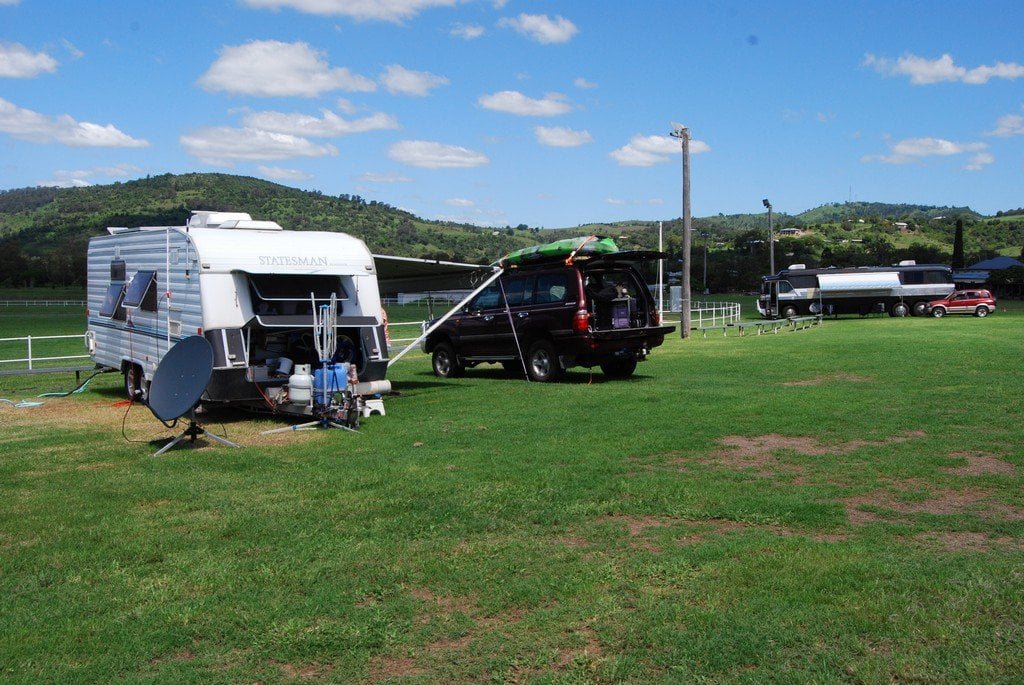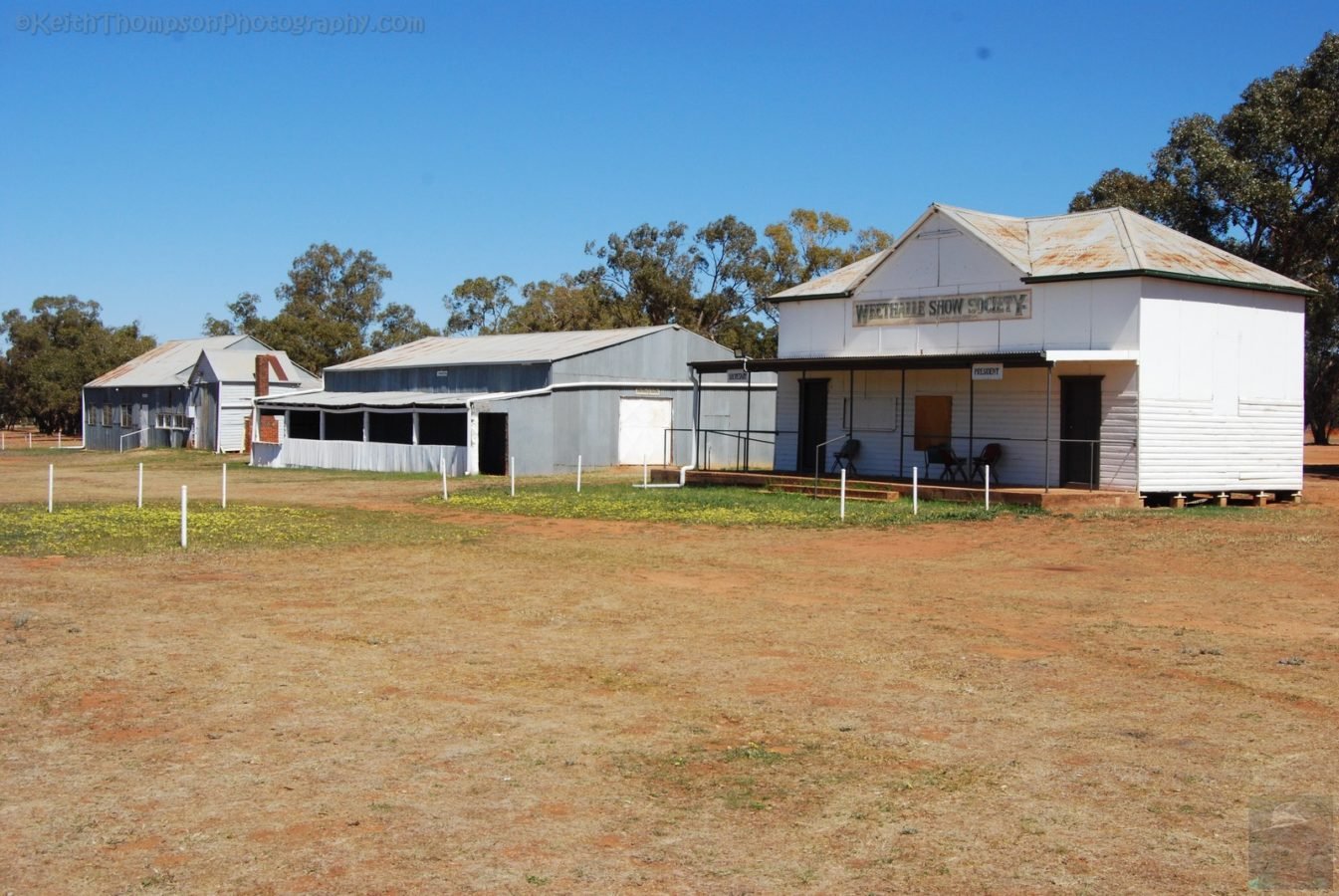In Part 1 of this series we looked at the structure of Caravan Parks, now we take a look at…
Campgrounds:
Definition: For the purpose of this article a Campground is a legally approved camping area not described as a Caravan Park and which charges a fee for use. In much the same way that we classify the listings in Full Range Camping this does not include those camps who request a small (say $5) donation but does include those which may have an honesty box or other means of making payments of $10 a night or more.
Campgrounds then can be divided between private, community or government ownership and/or operation.
An example of a private campground is the Broken Creek Campground near Benalla in Victoria pictured here and at the top; this is built around a now disused sand quarry which the owner already had and over several years has been developed to provide unpowered camping but with toilet, shower and camp kitchen facilities, plus non potable “drinkable” water, and a Dump Point. Currently (2019) the charges here are $7.50 per adult per night which is well worth it in this area. The owner has not been overloaded with Council requirements and existed for the first years with drop toilets and portaloos without any issues; flush toilets have recently been added.

Can I offer camping on my land? The short answer is Yes… and No.. depending entirely on where you live and your local Council as partly referred to above, so the first step is always ask the Council. If you want to offer free camping refer to our next article and the references to State regulations.
The next category we want to look at are Community Campgrounds which in many cases include Showgrounds.
First we will briefly consider the Non Showground offerings as Showgrounds are a special case as there are many variations. Community Campgrounds can range from those resembling a Caravan Park, such as this one at Baradine’s Camp Cypress. (This is often mistakenly referred to as the Showgrounds but it is actually not Showground camping but sits on land adjacent to the Showground and is Community managed as a separate registered business entity.). Camp Cypress has a full amenities block, camp kitchen, laundry (free), onsite accommodation, and a Dump Point and has a resident manager.
By contrast the RV campground at Sheffield in Tasmania is a simple rectangular piece of ground provided by the Council alongside the local oval, and set aside for fully self contained RVs at a fee of $10/night collected by a volunteer with most of the funds going to the Sheffield Steam and Heritage Centre which is nearby. There are no facilities here except for a drinking water tap for tank filling and a Dump Point on the way in.


Showgrounds are a more complex subject as there are many forms of both ownership and management. It is worth noting here that Showgrounds as a category often are taken to include Sport and Recreation Grounds which often have common issues in relation to ownership and management as Showgrounds.
The diversity of ownership and management is illustrated by this quotation from a NSW Crown Lands report: “There are 169 showgrounds on Crown land in NSW which accounts for 80% of all showgrounds in NSW. Out of the showgrounds on Crown land, 45% are managed by volunteer reserve trust boards, 45% by local councils and 10% by show societies or the department.”
From the above statement we can conclude that the remaining 20% of NSW Showgrounds are on private (Freehold) land; other States may have a similar mix; WA for example are almost all on Crown Land, due largely to the fact that “Approximately 92% of Western Australia is Crown land, whether unallocated or subject to reservation, dedication or leasing.” – https://www.austrade.gov.au/land-tenure/Land-tenure/crown-land
The end result on the ground for campers can vary hugely. Showgrounds in larger regional centres such as Kingaroy and Ipswich (pictured) have some form of Show Society or management body with full time office staff and hold the responsibility for booking in the campers; sometimes volunteers appear to collect fees at weekends
In the “middle” of the mix are those Showgrounds who have a caretaker on site in their own RV; these may be entirely volunteer positions in return for free camping or may be paid small amounts for their overall duties. One such is Lowood in the Lockyer Valley, pictured.
At the “bottom” of the scale are those with no on site presence and if there is a fee is usually collected by a volunteer daily or via an Honesty Box system; we should all endeavour to pay the fees for these as the facilities have to be maintained for us all to use, whether it is an amenities block or just mowing the grass. One such is in the small community of Weethalle in NSW where a local volunteer committee member calls to collect fees daily, failing that you can enquire and pay in the village.



Showgrounds – the rules, regulations and limitations:
Like Caravan Parks and Private Campgrounds, Showground camping is subject to the same requirement for a Council permit and would usually already comply with any environmental regulations as they are set up to accommodate travelling showmen and their families for the annual show. Even if the Showground is owned and operated by the Council the use of the grounds for camping is not a “given” as any change of use requires Council approval and is subject to objections from the community at large. This gives rise to the circumstances where local Caravan Park operators provide sufficient objection that camping either is not permitted or the number of sites is restricted (Albury – 5 sites, Wodonga 8 sites are 2 examples on opposite sides of the border). When visiting one of these restricted camps we should accept that it is better to have a few sites that can rotate visitors than none at all.
There are some quirky differences as well in restrictions, for example, in Queensland, a Showground which is operated by a Trust cannot offer Laundry facilities to campers – so don’t ask!
Showgrounds – General Observations:
The majority of Showgrounds, for the new campers, provide Power, Water and Toilet facilities as a minimum, most have showers and rubbish bins and are pet friendly. The vast majority do not take bookings but there are a few exceptions where space is limited. There are limits on the time you can stay usually only at the busy locations with limited sites; the majority are closed to campers for the annual show and any other major events.
Fees and Charges: There is increasing criticism recently about Showgrounds “becoming as dear as Caravan Parks” and I think occasionally may be justified, however there are a lot of the same considerations. As the Showground becomes more popular the effort required to maintain the amenities and the grounds increases, if there was no camping the grass would not be mown as often and the toilets would be closed, the power and water bills would be much less and there may be no caretaker in many cases. We need to consider that there are also many who have the fees dictated by the Council as part of their permit conditions in order to appease the Caravan Parks who are also there to make a living. A prime example of this is Kununurra in WA where the fees are $35/night which is part of their agreement to offer camping but at a price “equitable” with the Caravan Park fees for the town (which are about $35 unpowered). On the plus side you have a lot more space to float around in and can usually take your pet pooch, plus there is no need to vacate by 10am (mostly), and no restricted access hours.
Below: Weethalle Showgrounds with lots of room!

The final category are what we might term Government Campgrounds, the majority of these of course are National Parks and State Forests, but also include Regional and Conservation Parks, Water Authorities, and Council owned and operated camping facilities. National Parks are not subject to any State or Local Government regulations regarding campgrounds and do not normally require any permits or approvals; this can change when major building works are involved.


First: National Parks and State Forests
It is not the intent of this article to deal with these State by State as we are all aware that there are considerable differences between fees and facilities, as well as methods of booking and paying. We recommend that for the latest information on National Parks camping you always check out the official website in each state as even the best maintained websites and Apps cannot be kept up to date for all of these; in Full Range Camping for example we have over 900 fee paying National Parks Campgrounds (as well as over 500 Free Camps in National Parks and Forests); even with the resources we have it is not possible to maintain the status and fees of all of these when there are changes every year in fees, and often in other details. Web addresses current at July 2019 are given at the end of this article.
Other Government Campgrounds:
Water authorities, Regional Parks, Conservation Authorities and Councils make up the majority of these and while most are free camps (which we look at in the next article) there are some with fees and in general are little different from Community run camping facilities. Pictured here is the campground at Black River, near Stanley, Tasmania; this is a Conservation Area which is now managed by the National Parks body with fees via a self registration system (Honesty Box) at the entrance.

Website Links for National Parks: (and State Forests FYI as applicable)
Queensland national Parks and State Forests:
Camping Information: https://qpws.usedirect.com/QPWS/Facilities/SearchView.aspx
Find Parks: https://parks.des.qld.gov.au/parks/
Bookings: https://parks.des.qld.gov.au/experiences/camping/camping_bookings.html
Parks Pass: Queensland has no Parks Pass requirements for National Parks
NSW National Parks:
Camping Information Search: https://www.nationalparks.nsw.gov.au/camping-and-accommodation/search
Bookings: https://www.nationalparks.nsw.gov.au/bookings
Parks Pass: https://www.nationalparks.nsw.gov.au/passes-and-fees/annual-passes
Concession and other discounts available
State Forests NSW (Free): https://www.forestrycorporation.com.au/visit/activities/camping-and-picnics
ACT:
Camping in the ACT: https://www.parks.act.gov.au/where-to-stay
Bookings: https://www.parks.act.gov.au/get-involved/bookings-and-permits
Parks Pass: The ACT has no Parks Pass requirements
Parks Victoria:
Camping information: https://parkweb.vic.gov.au/visit/popular-activities/camping
Bookings: https://www.parkstay.vic.gov.au/book-your-stay
Parks Pass: Parks Victoria has no Parks Pass required
State Forests Victoria: https://www.ffm.vic.gov.au/recreational-activities/walking-and-camping
Parks Tasmania:
Camping information and guides: https://www.parks.tas.gov.au/index.aspx?base=412
Bookings: Tasmania has no online booking service currently
Parks Pass: https://parks.tas.gov.au/explore-our-parks/know-before-you-go/entry-fees
Seniors concessions available
State Forests Tasmania (Free): https://www.sttas.com.au/using-our-forests/visiting-our-forests
South Australia:
Camping and general Information: https://www.parks.sa.gov.au/know-before-you-go
Bookings: https://www.parks.sa.gov.au/book-and-pay
Parks Pass: https://www.parks.sa.gov.au/book-and-pay/parks-passes
Concessions are available
South Australia Forests: https://www.forestrysa.com.au/visit-our-forests/
Western Australia:
Camping: https://exploreparks.dbca.wa.gov.au/camping
Search and Bookings: https://parkstay.dbca.wa.gov.au/search-availability/information/
Parks Pass: https://shop.dbca.wa.gov.au/collections/park-passes
Concessions are available
Northern Territory:
Campgrounds List: https://nt.gov.au/leisure/parks-reserves
Bookings: Since 2022 Online bookings Only. https://parkbookings.nt.gov.au/Web/
Parks Pass: (Introduced 2022) https://nt.gov.au/parks/park-pass
No concessions are available and passes are per person not per vehicle
NT – Kakadu:
Not an NT Park but Parks Australia (Commonwealth) and no bookings required
Camping information: https://parksaustralia.gov.au/kakadu/stay/camping/
